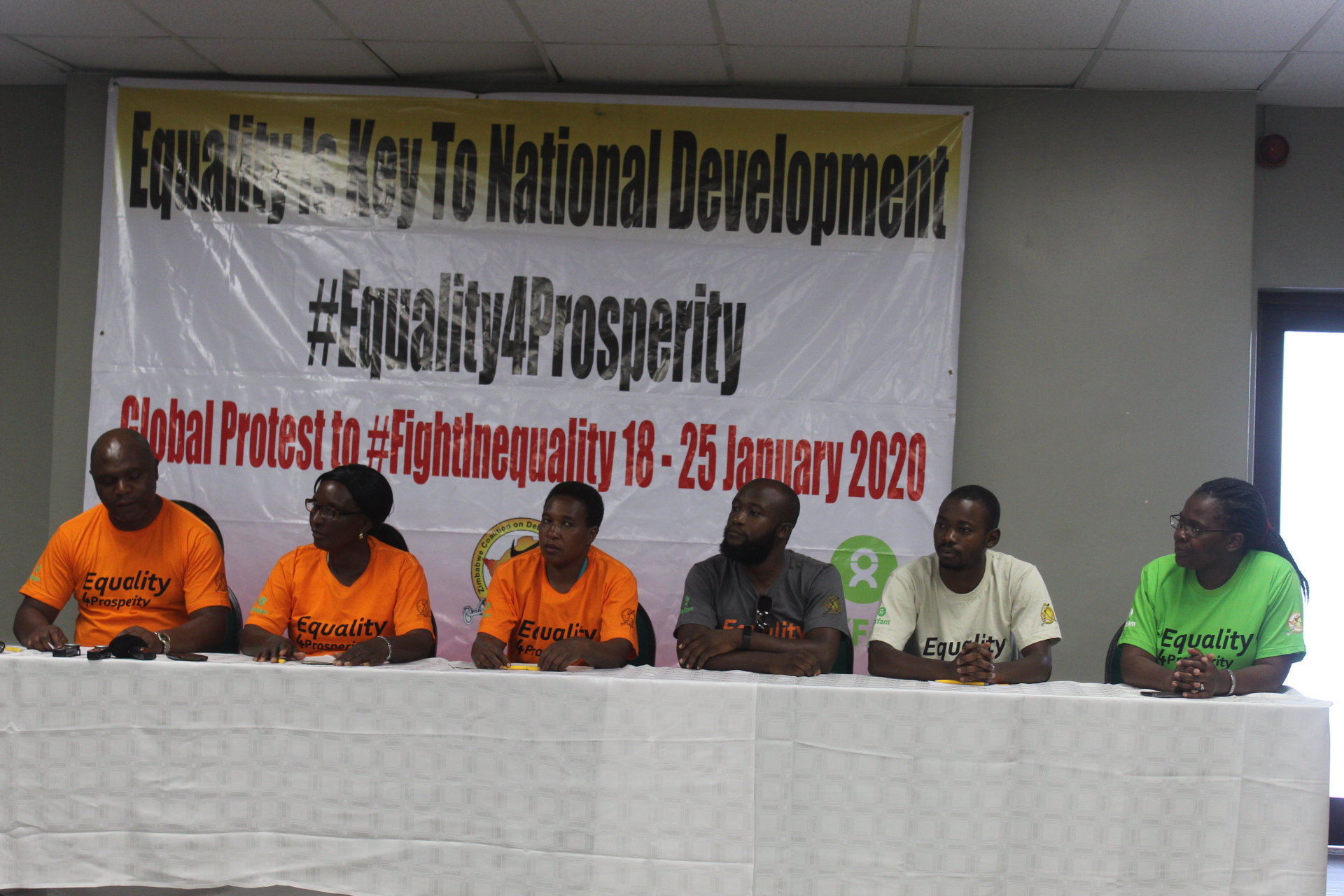By Joyce Mukucha and Anyway Yotamu
Since inequality is becoming the order of the day globally and in Zimbabwe, disparities in access to equal opportunities and rights including water, sanitation, health and education are increasing the gap between the rich and the poor.
Inequality is leading to social disharmony, mistrust, societal violence, economic regression and deepening poverty among other effects.
In an effort to bridge the gap and combat these imbalances, the Zimbabwe Coalition on Debt and Development (ZIMCODD), Transparency International Zimbabwean (TIZ), Youth Empowerment and Transformation Trust (YETT), Zimbabwe Council of Churches (ZCC) together with other faith based organisations have joined hands in spearheading the global protest to fight inequality of different contexts.
The Global Protest Against Inequality coincides with the World Economic Forum to draw attention from governments and other responsible authorities around issues of inequality.
These Civil Society Organisations (CSOs) are also making concerted efforts to ensure that Government puts in place measures that promote an equal world for everyone.
Addressing the media pertaining the Global Protest to Fight Inequality in Harare on the 24th of January 2020, the Zimbabwe Council of Churches (ZCC) representative Father Paul Gwese said corruption was the major vice deepening all forms of inequalities so there was need to put in place drastic measures to combat corruption and ensure that every citizen lives a decent life.
He pointed out that people from across the globe were using protest marches to curb inequalities. Thus there is need for progressive Zimbabweans, activists and faith based organisations to apply the same concept in ensuring that transparency exists in Zimbabwe.
“Equality is key to development. The prevalence of disparities in societies has created a world of the haves and the have-nots and it calls for tremendous actions to be taken to guarantee that there is equal representation of men and women and equal access to resources by everyone,” he said.
Speaking on behalf of youths, YETT programs officer Farai Mlanga said Government ought to create inclusive policies that take into consideration aspirations of young people.
“There is need for Government to incorporate youths in land and natural resource extraction value chain. It is disheartening to note that young people are always left behind yet the future of the nation lies in them. The unequal access of resources against youths is the major cause that leads young people to become perpetrators of violence in different communities. Through this global protest to fight inequality, we are committed to raise concerns and proffer solutions which combat the vice,” he said.
Concerning gender disparities, a representative of women in Domboshava, Susan Mujati complained that gender structures perpetuated by gender and social norms disempower women thereby relegating them to second class citizens not fit to control or acquire assets. She bemoaned the fact that men assume influential positions of power on their own.
According to the United Nations Development Programme, Zimbabwe was ranked 126 out of 162 countries in the Gender Inequality Index of 2018. The Oxfam International Report also revealed that the economic inequalities between men and women globally are worrying to the extent that the monetary value of unpaid care work globally for women aged 15 and above is at least $ 10. 8 trillion annually.
Other representatives of CSOs highlighted that the austerity measures implemented in 2019 against the backdrop of deep socio-economic woes did not help the situation,rather they cultivated an enabling environment for Inequality to thrive. Others pointed out that there was unequal access to healthcare, key quality education, climate induced inequalities among others.
“In terms of education, the rich are benefitting more at the expense of the poor. Schools with better facilities have remained a preserve of the few of w better socio-economic status and parents of lower status are finding it difficult to afford all the educational requirements,” said Sandra Mutopo, a Domboshava Livelihoods representative.
She also suggested that concerning access health services, it was of paramount importance for the Government to invest in social services and deliver free public social services including health , education to ensure that the poor and marginalised are catered for and ensure that SDG 3 is attainable.
ZIMCODD and TIZ emphasised that they will continue to foster various initiatives which fight against inequality and corruption and continue to lobby mechanisms and Anti-corruption campaigns for sanity to prevail in Zimbabwe.
The preliminary findings of Oxfam in Zimbabwe and UNDP Inequality Report reveals that in 2018, the richest 10 percent of Zimbabweans took more income than the poorest half of citizens. In 2017, the Zimbabwe’s expenditure Gini coefficient was 0,44, representing an increasing from 2011 after years of decline.






